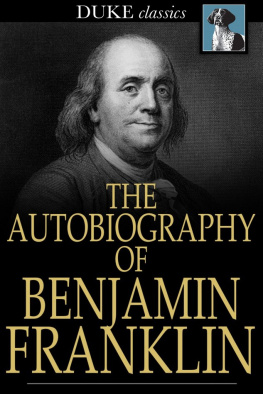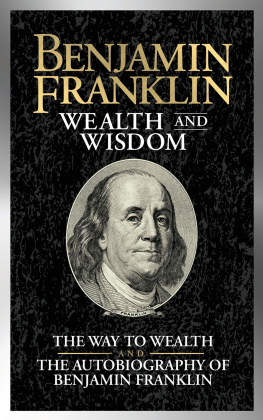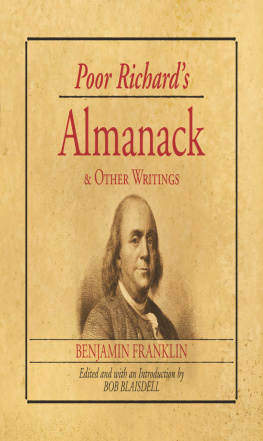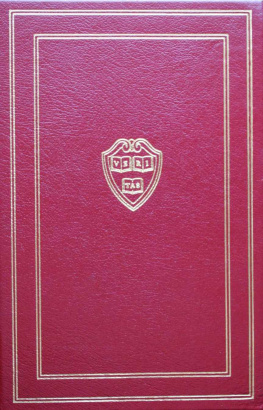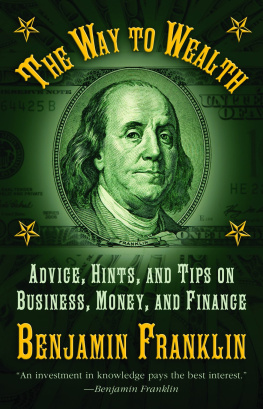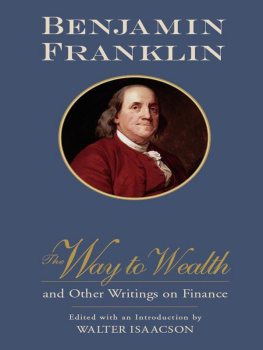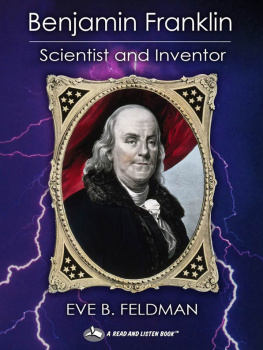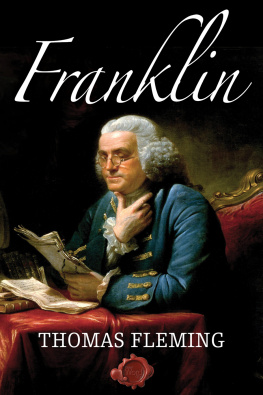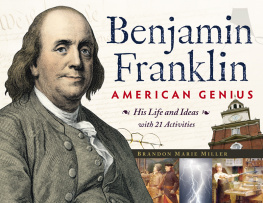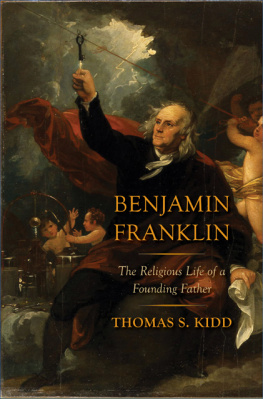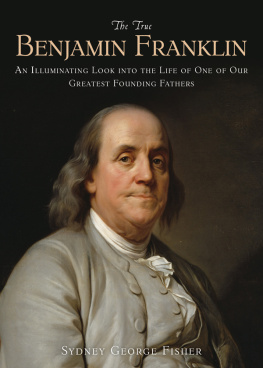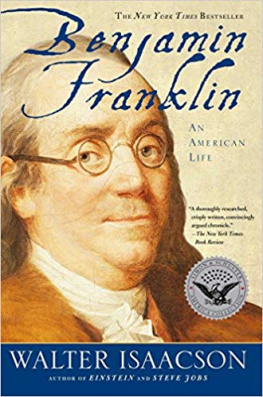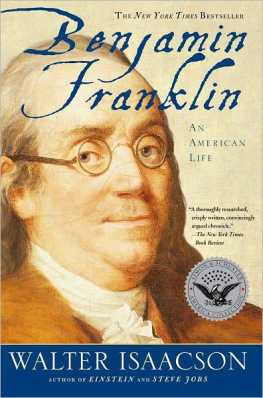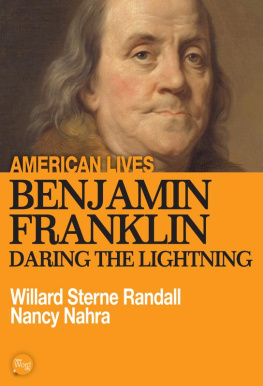THE AUTOBIOGRAPHY OF BENJAMIN FRANKLIN
1706-1757
* * *
BENJAMIN FRANKLIN
*
The Autobiography of Benjamin Franklin
1706-1757
From a 1793 edition
ISBN 978-1-62011-444-5
Duke Classics
2012 Duke Classics and its licensors. All rights reserved.
While every effort has been used to ensure the accuracy and reliability of the information contained in this edition, Duke Classics does not assume liability or responsibility for any errors or omissions in this book. Duke Classics does not accept responsibility for loss suffered as a result of reliance upon the accuracy or currency of information contained in this book.
Contents
*
Introductory Note
*
BENJAMIN FRANKLIN was born in Milk Street, Boston, on January6, 1706. His father, Josiah Franklin, was a tallow chandler whomarried twice, and of his seventeen children Benjamin was the youngestson. His schooling ended at ten, and at twelve he was bound apprenticeto his brother James, a printer, who published the "New EnglandCourant." To this journal he became a contributor, and later was fora time its nominal editor. But the brothers quarreled, and Benjaminran away, going first to New York, and thence to Philadelphia, wherehe arrived in October, 1723. He soon obtained work as a printer,but after a few months he was induced by Governor Keith to go toLondon, where, finding Keith's promises empty, he again worked as acompositor till he was brought back to Philadelphia by a merchantnamed Denman, who gave him a position in his business. On Denman'sdeath he returned to his former trade, and shortly set up a printinghouse of his own from which he published "The Pennsylvania Gazette,"to which he contributed many essays, and which he made a medium foragitating a variety of local reforms. In 1732 he began to issue hisfamous "Poor Richard's Almanac" for the enrichment of which he borrowedor composed those pithy utterances of worldly wisdom which are thebasis of a large part of his popular reputation. In 1758, the yearin which he ceases writing for the Almanac, he printed in it "FatherAbraham's Sermon," now regarded as the most famous piece of literatureproduced in Colonial America.
Meantime Franklin was concerning himself more and more withpublic affairs. He set forth a scheme for an Academy, which wastaken up later and finally developed into the University of Pennsylvania;and he founded an "American Philosophical Society" for the purposeof enabling scientific men to communicate their discoveries to oneanother. He himself had already begun his electrical researches,which, with other scientific inquiries, he called on in the intervalsof money-making and politics to the end of his life. In 1748 hesold his business in order to get leisure for study, having nowacquired comparative wealth; and in a few years he had made discoveriesthat gave him a reputation with the learned throughout Europe. Inpolitics he proved very able both as an administrator and as acontroversialist; but his record as an office-holder is stained bythe use he made of his position to advance his relatives. His mostnotable service in home politics was his reform of the postal system;but his fame as a statesman rests chiefly on his services in connectionwith the relations of the Colonies with Great Britain, and later withFrance. In 1757 he was sent to England to protest against theinfluence of the Penns in the government of the colony, and for fiveyears he remained there, striving to enlighten the people and theministry of England as to Colonial conditions. On his return toAmerica he played an honorable part in the Paxton affair, throughwhich he lost his seat in the Assembly; but in 1764 he was againdespatched to England as agent for the colony, this time to petitionthe King to resume the government from the hands of the proprietors.In London he actively opposed the proposed Stamp Act, but lost thecredit for this and much of his popularity through his securing fora friend the office of stamp agent in America. Even his effectivework in helping to obtain the repeal of the act left him still asuspect; but he continued his efforts to present the case for theColonies as the troubles thickened toward the crisis of the Revolution.In 1767 he crossed to France, where he was received with honor; butbefore his return home in 1775 he lost his position as postmasterthrough his share in divulging to Massachusetts the famous letter ofHutchinson and Oliver. On his arrival in Philadelphia he was chosena member of the Continental Congress and in 1777 he was despatchedto France as commissioner for the United States. Here he remainedtill 1785, the favorite of French society; and with such success didhe conduct the affairs of his country that when he finally returnedhe received a place only second to that of Washington as the championof American independence. He died on April 17, 1790.
The first five chapters of the Autobiography were composed inEngland in 1771, continued in 1784-5, and again in 1788, at whichdate he brought it down to 1757. After a most extraordinary seriesof adventures, the original form of the manuscript was finally printedby Mr. John Bigelow, and is here reproduced in recognition of itsvalue as a picture of one of the most notable personalities of Colonialtimes, and of its acknowledged rank as one of the great autobiographiesof the world.
Benjamin Franklin - His Autobiography 1706-1757
*
TWYFORD, at the Bishop of St. Asaph's, 1771.
DEAR SON: I have ever had pleasure in obtaining any littleanecdotes of my ancestors. You may remember the inquiries I madeamong the remains of my relations when you were with me in England,and the journey I undertook for that purpose. Imagining it may beequally agreeable to you to know the circumstances of my life,many of which you are yet unacquainted with, and expecting the enjoymentof a week's uninterrupted leisure in my present country retirement,I sit down to write them for you. To which I have besides someother inducements. Having emerged from the poverty and obscurityin which I was born and bred, to a state of affluence and somedegree of reputation in the world, and having gone so far throughlife with a considerable share of felicity, the conducing meansI made use of, which with the blessing of God so well succeeded,my posterity may like to know, as they may find some of themsuitable to their own situations, and therefore fit to be imitated.
That felicity, when I reflected on it, has induced me sometimesto say, that were it offered to my choice, I should have no objectionto a repetition of the same life from its beginning, only askingthe advantages authors have in a second edition to correct some faultsof the first. So I might, besides correcting the faults, change somesinister accidents and events of it for others more favorable.But though this were denied, I should still accept the offer.Since such a repetition is not to be expected, the next thingmost like living one's life over again seems to be a recollectionof that life, and to make that recollection as durable as possibleby putting it down in writing.
Hereby, too, I shall indulge the inclination so natural in old men,to be talking of themselves and their own past actions; and I shallindulge it without being tiresome to others, who, through respectto age, might conceive themselves obliged to give me a hearing,since this may be read or not as any one pleases. And, lastly (I mayas well confess it, since my denial of it will be believed by nobody),perhaps I shall a good deal gratify my own vanity. Indeed, I scarceever heard or saw the introductory words, "Without vanity I may say,"&c., but some vain thing immediately followed. Most people dislikevanity in others, whatever share they have of it themselves;but I give it fair quarter wherever I meet with it, being persuadedthat it is often productive of good to the possessor, and to othersthat are within his sphere of action; and therefore, in many cases,it would not be altogether absurd if a man were to thank God for hisvanity among the other comforts of life.

